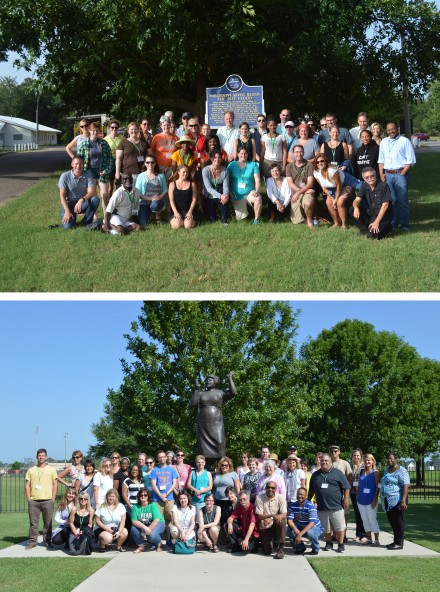 In total, 72 K-12 teachers from across the nation took part in this summer's "Most Southern Place on Earth" workshops. Photos by Amy Kramer and Brady Gilliam.
In total, 72 K-12 teachers from across the nation took part in this summer's "Most Southern Place on Earth" workshops. Photos by Amy Kramer and Brady Gilliam.The National Endowment for the Humanities’ “Most Southern Place on Earth” workshop, presented twice this summer (June 21-27 and July 12-18) by The Delta Center for Culture and Learning at Delta State University, exposed 72 K-12 teachers from throughout the United States to the Mississippi Delta’s rich history and cultural heritage. Workshop participants represented 33 states, including Alaska, California, Florida, New Hampshire and Indiana. Several teachers from Mississippi participated as well, including a teacher from Mound Bayou.
Over the past six years, the NEH workshops have brought over $1 million in federal grants to Delta State University. Through these grants, the workshops have generated educational and economic spread effects regionally and nationally.
The workshop model uses an experiential learning approach, giving participants direct contact with and access to historically and culturally significant people and places in the Mississippi Delta. Dr. Rolando Herts, director of The Delta Center, said this approach inspires deeper understanding of historical events among the participants. The approach also stimulates economic activity, as workshop participants stay in hotels, dine in restaurants and visit educational attractions in Cleveland, Bolivar County and the Delta region.
“This blending of educational and tourism-centered economic activity is beneficial to the Mississippi Delta’s federal designation as a National Heritage Area,” said Herts. “The Mississippi Delta National Heritage Area is a partnership between the region and the National Park Service to raise awareness of the value of the Mississippi Delta’s rich cultural heritage.”
The NEH workshop has created a national network of over 500 educational and cultural ambassadors for the MDNHA. Participants take what they have learned from the workshop back to their schools and communities, sharing stories and lessons from the Delta with students, colleagues, family, and friends nationally and globally. Over the years, many past participants have made return visits to the region, bringing others with them, which has broadened the workshop’s educational and economic impact for the MDNHA.
Dr. Luther Brown, former director of The Delta Center, returned to serve as lead facilitator of this year’s workshops, with support from Lee Aylward, and Brady Gilliam and Amy Kramer, both Robertson Scholars from Duke University and the University of North Carolina at Chapel Hill.
Workshop participants heard presentations from blues, southern religion and great migration experts, including: Dr. David Evans, professor of ethnomusicology and regional Studies, University of Memphis; Mississippi Delta native, Dr. Edgar Smith, former vice president of Academic Affairs, University of Massachusetts System; Dr. Charles Reagan Wilson, former director of the Center for the Study of Southern Culture, University of Mississippi; and Dr. John Strait, professor of geography at Sam Houston State University.
In addition, workshop participants were engaged with living historical figures, including civil rights activis Charles McLaurin, who met Fannie Lou Hamer while working with the Student Nonviolent Coordinating Committee; Cathy Wong, who spoke about the presence of Chinese in the Delta and their cultural influence; and key people involved with the Emmett Till story, including Till’s cousins Simeon Wright and Wheeler Parker, both of whom were with Till before his murder.
Participants also visited many historical and educational points of interest throughout the region, including: Dockery Farm, known as the birthplace of the blues, located between Cleveland and Ruleville; Taborian Hospital in Mound Bayou; Emmett Till Intrepid Center in Glendora; blues legend Robert Johnson’s gravesite at Little Zion Missionary Baptist Church and Fort Pemberton in Greenwood; and the 1927 Flood Museum, Century of History Museum at Hebrew Union Congregation, and Chinese and African American cemeteries in Greenville. The group also traveled to Memphis, the Delta’s largest city, to visit The Cotton Museum, National Civil Rights Museum and Stax Museum of American Soul Music.
The mission of The Delta Center is to promote greater understanding of Mississippi Delta culture and history and its significance to the world through education, partnerships and community engagement. The Delta Center serves as the management entity of the MDNHA and is the home of the NEH’s “Most Southern Place on Earth” workshop and the International Delta Blues Project. For more information, visit https://www.deltastate.edu/academics/delta-center-for-culture-and-learning/.
The Mississippi Delta National Heritage Area is a partnership between the people of the Mississippi Delta and the National Park Service. The MDNHA was designated by U.S. Congress in 2009 and is governed by a board of directors representing agencies and organizations defined in the congressional legislation. More information about the MDNHA, including the complete approved management plan, is available at http://www.msdeltaheritage.com.

